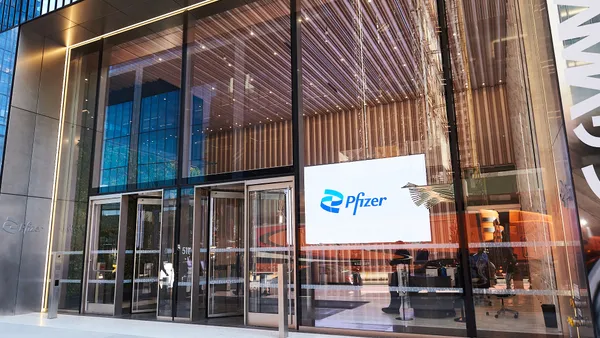PUBLISHER Lisa Banket EDITOR Taren Grom CREATIVE DIRECTOR Marah Walsh DIRECTOR OF SALES Darlene Kwiatkowski CONTRIBUTING EDITORS Virginia Kirk Denise Myshko Elisabeth Pena Kim Ribbink Alex Robinson Lynda Sears Copyright 2002 by PharmaLinx LLC, Titusville, NJ Printed in the U.S.A. Volume Two, Number Six PharmaVOICE is published eight times per year by PharmaLinx LLC, P.O.Box 327, Titusville, NJ 08560. Postmaster: Send address changes to PharmaVoice, P.O. Box 327, Titusville, NJ 08560. PharmaVOICECoverage and Distribution: Domestic subscriptions are available at $106 for one year (8 issues). Foreign subscriptions: 8 issues US$220. Contact PharmaVoice at P.O. Box 327, Titusville, NJ 08560. Call us at 609.730.0196 or FAX your order to 609.730.0197. Contributions: PharmaVOICE is not responsible for unsolicited contributions of any type. Unless otherwise agreed in writing, PharmaVOICE retains all rights on material published in PharmaVOICE for a period of six months after publication and reprint rights after that period expires. Email: [email protected]. Change of address: Please allow six weeks for achange of address. Send your new address along with your sub scription label to PharmaVOICE, P.O. Box 327, Titusville, NJ 08560. Call us at 609.730.0196 or FAX your change to 609.730.0197. Email: [email protected]. IMPORTANT NOTICE: The post office will not forward copies of this magazine. PharmaVOICE is not respon sible for replacing undelivered copies due to lack of or late notification of address change. Advertising in PharmaVOICE: To advertise in Pharma VOICE please contact our Advertising Department at P.O.Box 327, Titusville, NJ 08560, or telephone us at 609.730.0196. Email: [email protected]. www.pharmalinx.com
THE FORUM FOR THE INDUSTRY EXECUTIVE Volume 2 . Number 6 Send your letters to feedback@pharma linx.com. Please include your name, title, company, and business phone number. Let ters chosen for publication may be edited for length and clarity. All submissions become the property of PharmaLinx LLC.
Marketers beware — the public is watching. In an effort to stem abuses by a few, the many unanimously have adopted, and are adhering to, a Code of Interactions with Healthcare Professionals. Developed in conjunction with the Pharmaceutical Research and Manufacturers of America (PhRMA), CEOs of Ameri ca’s largest pharmaceutical and biotechnology companies, and the American Medical Association, the guidelines outline a specif ic ethical code of conduct between sales reps and healthcare professionals. The new code is comprehensive and very specific as to what is an acceptable interaction between marketers and physicians. The goal of the new code is to eliminate noneducational communications and interactions, such as dine and dash programs, or the even more demeaning gas and go tactics. Pharmaceutical executives point out that while by no means were these practices being employed by the industry as a whole, such actions did provide fodder for the media and industry critics. “It was very important for PhRMA to address this issue,” says Ron Pantello, CEO of Lally McFarland & Pantello Euro RSCG, cochairman, Euro RSCG Health care, and a newly elected member of the board of PhRMA. “The transparent abuses by some companies — the dine and dash and gas and go activities — that were being reported in the press were hurting the image of the pharmaceutical industry, and this needed to be stopped. Further, these types of promotional activities encourage legislation that could negatively affect our industry.” Clearly, abiding by the new code will help tame the perception that pharmaceutical companies are in the practice of buying physicians’ loyalty through the advance ment of extravagant and lavish trips, give aways, and consultant fees. The voluntary code is being lauded by stakeholders as a proactive step to raise the industry’s image in the public sector. Exec utives say this is especially important now in light of the current business environ ment across all industries. The impact on the sales rep/physician relationship can only be improved say phar maceutical leaders and physicians. The guidelines bring the focus back to scientific and educational information and the bene fits of medication, which is where the inter action should be. According to Medicalliance Inc., which conducted a comprehensive survey to gauge industry reaction to the new guidelines, sales reps, those on the front lines, are relieved. Some have stated that the new guidelines level the playing field and relieve them from having to organize special events. The new code prohibits reps from treating healthcare providers to ball games, sporting events, golf, theater, or concerts. In addition, the code limits the value of gifts at no more than $100 and should benefit patient care and must be conducive to providing scien tific or educational information. The code does allow for meals, if they are modest, and the restaurant or venue is con ducive to discussion, and the sales rep is reviewing educational or scientific themes. The code prohibits pharmaceutical com panies from covering the cost of travel, lodging, or meals for nonfaculty attendees at companysponsored programs. This means that companies cannot pay for spouses or guests. For companies that do intend to stay within code, the biggest changes will like ly be how information is presented to healthcare professionals — and who is watching the presenters. Taren Grom Editor M It was very important for PhRMA to address this issue.The transparent abuses by some companies … that were being reported in the press were hurting the image of the pharmaceutical industry,and this needed to be stopped. Ron Pantello











